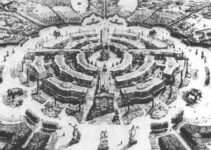The American Revolution is a chapter in history that’s often romanticized, with tales of valor, heroism, and the pursuit of freedom. However, at its heart, the Revolution was a complex and turbulent period filled with intrigue, shifting allegiances, and, in the case of Benedict Arnold, betrayal.
Nathaniel Philbrick’s book “Valiant Ambition: George Washington, Benedict Arnold, and the Fate of the American Revolution” delves deep into this pivotal period, shedding light on the lives of these two men and the broader context of the struggle for American independence. In this article, we will explore the meaning and significance of “Valiant Ambition.”

Early Life and Schooling
On February 22, 1732, George Washington was born to Augustine and Mary Ball Washington at the family farm on Popes Creek in Westmoreland County, Virginia. George’s dad was a big shot in the local plantation community and a judge in the county court.
His first wife, Jane Butler, passed away in 1729, leaving him to raise their three children—Lawrence, Augustine, Jr., and Jane. Augustine and Mary had six children, including George, Elizabeth, Samuel, John Augustine, Charles, and Mildred. George was the eldest.
Read Also:
- How Did Helen Keller Fly A Plane
- I Taught Online School This Year It Was A Disgrace
- What Does It Mean When A Peacock Spreads His Feathers
Understanding the “Valiant Ambition: George Washington, Benedict Arnold, and the Fate of the American Revolution”
The title of Nathaniel Philbrick’s book, “Valiant Ambition,” encapsulates the central theme and essence of the story. Let’s break it down to understand its meaning:
- Valiant: The term “valiant” refers to bravery, courage, and a willingness to face danger and adversity with determination. It signifies the heroic qualities exhibited by individuals during the American Revolution.
- Ambition: “Ambition” suggests a strong desire for success, recognition, or achievement. In the context of the American Revolution, it reflects the ambitions of key figures like George Washington and Benedict Arnold, who aspired to shape the course of history.
The juxtaposition of “valiant” and “ambition” in the title sets the stage for a narrative that explores the heroic efforts and personal ambitions of two prominent figures during a tumultuous period in American history.
Coupledom and Domesticity
The first lady of the United States, Martha Washington, fought in the Revolutionary War. She was instrumental in the day-to-day operations of her husbands’ businesses. She took care of her kids, grandkids, nieces, and nephews, and was George Washington’s “worthy partner” for nearly 40 years.
Martha Dandridge Custis, who was 27 at the time of her marriage to George Washington and originally hailing from the Tidewater region of Virginia, tied the knot with Washington on January 6, 1759.
Upon the passing of her first husband, Daniel Parke Custis, Martha became the only heir to a large estate (in the form of land and enslaved people). John, popularly known as “Jacky,” and Martha, commonly known as “Patsy,” were two of her small children.
Martha managed the household crew, which included both paid and enslaved butlers, housekeepers, maids, cooks, waiters, laundresses, spinners, seamstresses, gardeners, and more. The 17-year-old Patsy’s seizure and death in 1773 cruelly cut short their joyful years at Mount Vernon.
War of Independence
During the Revolutionary War, Martha Washington administered Mount Vernon with the help of her husband’s cousin while George Washington was away leading the army.
Nearly half of the war was spent in camp, where she hosted dignitaries and colonial and foreign authorities. She also visited the sick and injured in the hospitals and helped copy letters. Martha Washington’s son John died of camp sickness at Yorktown, obscuring much of the joy at the end of the war.
George Washington: The Valiant Leader
George Washington, one of the central figures of the American Revolution, exemplified the qualities of valiance and leadership. His valiant ambition lay in his unwavering commitment to the cause of American independence:
- Courage in Battle: Washington’s military leadership and personal courage on the battlefield earned him the admiration of his troops and the respect of his adversaries. His resolve during the harsh winter at Valley Forge is a testament to his commitment.
- Visionary Leader: Beyond his military prowess, Washington possessed a visionary ambition to create a united and independent nation. He played a pivotal role in drafting the U.S. Constitution and served as the country’s first president.
- The Embodiment of Valiance: George Washington’s character symbolizes valiance in the face of adversity. His willingness to endure hardships for the greater good of the American people is a hallmark of his legacy.
Benedict Arnold: Ambition Gone Awry
In stark contrast to Washington’s valiant ambition, Benedict Arnold’s story serves as a cautionary tale of ambition leading to betrayal and downfall:
- Early Heroism: Benedict Arnold began as a promising military officer known for his bravery in battle. His valiant ambition to serve the American cause initially aligned with the revolutionary ideals.
- Betrayal: However, as the war progressed, Arnold’s ambitions took a darker turn. Feeling undervalued and resentful, he conspired with the British to surrender the strategic fort at West Point. This act of betrayal shook the American cause to its core.
- Legacy of Infamy: Benedict Arnold’s name has become synonymous with betrayal. His ambition, once seen as valiant, was forever tainted by his treacherous actions, making him one of the most infamous figures in American history.
The Fate of the American Revolution
“Valiant Ambition” provides readers with a nuanced understanding of the American Revolution and the complex interplay of personalities, ambitions, and circumstances that shaped its outcome:
- Human Complexity: The book highlights the human complexity of historical figures. It reminds us that even the most valiant heroes can have flaws, while those with noble ambitions can succumb to moral failings.
- Turbulent Times: The American Revolution was a tumultuous period filled with shifting allegiances, moral dilemmas, and moments of betrayal. It underscores the challenges faced by those striving for independence.
- Legacy and Redemption: “Valiant Ambition” explores the themes of legacy and redemption. While Benedict Arnold’s legacy remains tarnished, the book prompts reflection on whether his earlier valiant actions should be completely overshadowed by his betrayal.
- The Fragility of Revolution: The narrative serves as a reminder of the fragility of revolutions and the importance of leadership and moral character in shaping their outcomes.
Read Also:
- Why Do I Cry When I Yawn
- What Does The Feeling Is Mutual Mean
- Which Line From Utopia Is An Example Of An Anecdote
Conclusion
Nathaniel Philbrick’s “Valiant Ambition: George Washington, Benedict Arnold, and the Fate of the American Revolution” offers readers a compelling exploration of the complex interplay between valiant ambition and personal ambition during a pivotal moment in history.
The valiance of George Washington and the tragic ambition of Benedict Arnold serve as a lens through which we can better understand the challenges, sacrifices, and betrayals that marked the American Revolution.
Ultimately, the book invites us to contemplate the enduring legacy of these historical figures and the lessons they offer for the present and future.


